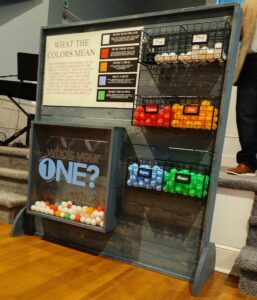How to Say Hello–3 Practical Ways to Greet Your Guests

I recently revamped the front entrance to our home. I bought a new doormat and new pillows for the bench, and spruced up a wreath for the door. Then I did something I’ve never done before… I hung up a sign to greet visitors with large letters that say, “WELCOME.” (As an introvert, it should more accurately say, “Welcome… unless my people meter is low. Then, not so much.” But that wouldn’t fit on a sign.)
It’s easy for guests at my home to know the way in. There is a clearly marked driveway for parking, an easily accessible front door (which is also the only entrance), and chances are, I will be there to show them our foyer with a visible bathroom just to their left. If you are visiting my house for the first time, you will have no problems knowing where to go.
Wouldn’t it be great if visitors to our churches could have that same experience? In this week’s episode of the Replant Bootcamp podcast, Jimbo and Bob tackle the unique challenges (and advantages!) normative size churches face when implementing a hospitality team.
Greeting Starts at the Door– But Which One?

When we started at Central Baptist, one of the first things we noticed was how many different ways there are to get into the building. We have a front entrance that faces the road– but that’s not the “typical” entrance, because using it would actually place you coming into the back of the church. That entrance made sense when everyone walked to church and there was only one part of the building– the sanctuary and classrooms underneath. But an addition long ago placed parking behind the church and made a new, single-door entrance. This entrance would take you through our old classrooms which were no longer in use and up a set of narrow stairs to the sanctuary, where you come in to the side of the platform. A third addition in the 90s added a fellowship hall and wing which created a new, double door entrance that allowed access to the nursery and childrens’ areas and stairwell access to the upper level and the sanctuary.
It was a maze to navigate– and that was AFTER you’d made it through the dilapidated, weed-infested parking lot with the faded white lines which made it impossible to know exactly where you should park.
We had a few guests that actually left before ever getting inside because they just found the whole building impossible to navigate. When we hosted events at the church, people would genuinely get lost inside the corridors, hallways, and stairwells. Guests coming to the church were likely to wind up in an old, dusty flower closet wearing a choir robe from 1972 only to be found during a church clean up day several weeks later.
Ok, not really… But we realized we had a problem, and it was one of the first steps toward revitalization that we needed to take: We needed a clearly identified entrance.
The first thing we did was redo the church’s signage. We purchased a large banner for the road-facing entrance of the church. It can be changed out seasonally and can highlight special events like Vacation Bible School or Christmas and Easter services. We also purchased signage to show where visitors can park, and repaved the parking lot to make it simpler. Then we put up a large sandwich board style sign that welcomed everyone toward the double door entrance.
Once inside, we used clearly identifying signs to funnel people toward children’s areas, the sanctuary, and the restrooms, as needed. We made coming to our church as easy to navigate as coming to our house.
Unfortunately, great signage and great directions don’t always equal a successful greeter experience. To make people feel welcome, you can’t just show them the way in– you have to have people who make them feel at home.
We needed a greeter ministry or hospitality team to guide people to the right place once inside. Fortunately, our smaller church had an advantage in this area: First, it was easy to identify who was new. One look across our congregation could inform us of any new faces. Second, in a smaller church, everyone is a greeter!
Develop a Friendly Greeter Ministry
In the podcast, Bob stated, “People want to be welcomed and wanted, but not watched.” When we are thinking about the experience of a first time guest at our church, we need to ask ourselves this question from Jimbo: What does our church communicate about who we are and what we believe is important? From the parking lot, to the welcome desk or area, to the service itself, we are communicating a message to a first time guest. It needs to be a good one!
In the first few minutes of our service we typically go over our welcome and announcements. In those first few moments, first-time guests are mentally deciding whether or not they’ll return for a second visit. Are your announcements about upcoming committee meetings? Community outreach projects? Future children’s events? Adult Bible Study and Discipleship opportunities? What does your first few moments of service tell a first-time guest about what your church thinks is important?
What about the rest of the service? Are you joyful in worship? Is there excitement about being in the house of God? We know that corporate worship is integral to the discipleship and growth of the believer, and we know that there is great benefit to joining other believers in weekly fellowship. So how are we communicating that importance to our members and our guests?
Some churches feel passionately about an order of worship and a bulletin. Others have done away with them completely. The truth is, there isn’t a right or wrong answer for whether or not your church should or shouldn’t have them. One thing is clear–for a visitor, there is so much value and security in knowing what’s coming next.
I recently visited a church where my daughter serves while she is away at college. This church is a very large church of a different denomination than what I currently attend. The opportunity to be a “first-time guest” allowed me to really experience for myself the discomfort of unfamiliar places and faces. One thing they did well was to have a QR code for me to scan for the order of worship. I was able to quietly look at a bulletin and know when we would be reading scripture, what songs we would sing, when children were dismissed, and they even designated when to stand and when to sit for each part with a small asterisk. It made the experience so much easier.
One thing they also did well was their time of “fellowship.” This was a time to look around and greet unfamiliar faces and also to catch up with each other. As I mentioned above, I am an introvert– I want to go in my shell and peep out when I’m comfortable. This time can be really hard for me, especially in the middle of a service where I am already feeling very awkward. But instead of a meet and greet in the middle of the service, they offered for any guests to step into a small room off from the lobby and meet the pastor and his wife at the end of service if they chose to. They offered beverages and small snacks, and several friendly members stayed as well and said hello.
This church had clearly taken time to develop a culture of hospitality, and it made a difference in my experience as a guest. What efforts have you made to cultivate an environment where the guests to your church leave feeling cared for and considered?
Greeting that Goes Further than the Front Door

Every first-time guest is not just a visitor–they are a potential family member. We view our church as our family, so each person who visits is someone who we hope will eventually become a sister or brother in this family of believers we call Central Baptist. The gospel gives everyone a place to belong.
In order for your greeting to extend past the front door, you must be willing to invest time and energy into the follow-up for every single guest. In order to be known for hospitality, you must first learn to be hospitable. (Go figure.) It isn’t enough to just hand someone a first-time guest gift and say “Hello.” You need to take some time to get to know them.
Many pastors will run themselves to the ground in an effort to follow up with everyone and to engage every guest. But if you cultivate a culture of hospitality, you can expect your members to help you greet, engage, and follow-up with each visitor. One way to do this is to encourage your members to share a meal with someone they don’t know or have never shared a meal with–that can be a visitor, but it can also be another member they just don’t know that well.
Not everyone is gifted in the area of hospitality, but that’s why we “practice” hospitality. We can always get better at it. Pair up those people who are naturally gifted at making others feel comfortable with those who aren’t–show them how to engage with others.
Another way to cultivate a culture of hospitality is to give first time guests small gift cards to local eateries or coffee shops. Let them know that you would really like to sit down with them and have a conversation about the church and answer any questions they may have, or they can use it on their own, the choice is theirs. I’m willing to bet that they will take you up on the offer to sit down and chat! If your church does fellowship dinners for a small fee, offer guests a “free” coupon so that they feel comfortable coming back and being a part of that ministry.
The easiest and perhaps most used way to cultivate hospitality among your members is the card or phone call follow-up. Handwritten cards are always a nice gesture and feel so much more sincere than a formatted letter. (Jimbo recommends the Felt App for this purpose.) Do you have some members for whom a shared meal would be difficult? They would be great assets to use for card writing or simple follow up phone calls to welcome guests!
In order to be a church where guests turn into members, you must take the time to reflect on what message your church sends to each visitor that comes through your (well-marked, easily identifiable!) door.
Next Steps
Hopefully you now see the importance of starting a new (or adjusting your existing) greeter ministry. Some easy, practical next steps to take are:
- Ask an outsider to perform a “mystery shop”– this can be a friend, coworker, or neighbor whose opinion you respect. Ask them to assess what it’s like to be a first time guest at your church. What are their first impressions? What message did they leave with? Did they notice anything out of place or confusing? It can be easy to overlook our own flaws, that’s why we need an outside perspective on them.
- Take some time to polish your welcome and announcements time. Find a way to communicate an invitation for everyone and an orientation for guests. Make sure you’re giving your congregation guidance on the importance of Sunday morning worship and also what comes next. If something is different on a specific Sunday that will change the normal order or worship, explain that and give people the security to know what comes next.
- Find your greeters and your hospitality people– you’ll know them. These members always know who’s having surgery, who’s child is heading to college, who recently experienced a job change, who has moved. They know these things because they know people. They are excited to spend time with people and they enjoy meeting new people.
- Come to the Replant Summit to get ideas from others! If you want practical tips for people who have been where you are, you NEED to register and attend the Replant Summit in Atlanta August 28-29. There is no better opportunity to meet fellow replanters who are in the trenches with you. This is the retreat and refresh your ministry needs!

































